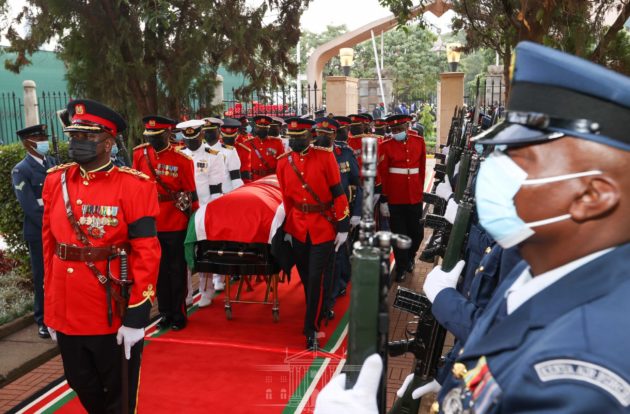The death of Kenya’s former President Mwai Kibaki on Friday marks one of the greatest epochs in the country’s socio-economic and political journey since independence. Kibaki’s 10-year tenure from December 2002 until April 2013 is the period that marked the country’s economic transformation by breaking the jinx from the errors of omission and commission of the previous regimes.
The progress was not by happenstance. Kibaki was a world-renowned economist educated at the prestigious London School of Economics. He is seen as the most successful Finance Minister who led in drafting some of the most successful macro-economic policies. He was highly respected by the Bretton Woods institutions for both his passion and expertise of the economy.
As fate would have it, Kibaki had an eventful political career during the one-party system, rising up to the position of Vice President. He later resigned from the government and formed his own party after he was dropped as VP by then-President Daniel arap Moi. He was a man with an independent mind, a fact that stood Kenya in good stead at the opportune moment.
On being sworn into office, the late president proclaimed the so called “Look East” policy, with China at the core. It was a big gamble at the time as he declared the shift of focus in Kenya’s development partners from the West to the East as Kenya was still predominantly dependent on the West for both bilateral and multilateral development aid.
Kibaki needed empathetic and realistic development partners to achieve his blueprint Vision 2030, a long-term development plan aimed at raising Kenya’s Gross Domestic Product (GDP) to 10 per cent annually and transforming Kenya into a middle-income country by 2030. For many years, Kenya’s GDP growth was below five percent per annum.
When Kibaki took office on December 29, 2002 Kenya’s economy was battered. The country was also steeped in debt from Western donors, who had demanded implementation of punitive structural adjustment programs and other unrealistic conditions that worsened the already deteriorating status quo.
But by the end of his first term in 2007, the country had completely turned around, a situation attributed to the mega projects constructed by Chinese contractors through Chinese support that Kibaki initiated. The infrastructural projects opened up the country in unprecedented ways by unclogging the supply chains that had suffocated from years of economic inertia and donor fatigue.
Arising from the friendly relations, China granted Kenya the approved Tourist Destination Status in 2004 after the doubling of Chinese tourists to the country. In March 2005, Kenya and China signed a Development Framework Cooperation Agreement that set out the modalities of deepening bi-lateral ties. During his tour of China the same year, Kibaki visited the economic, financial, trade and shipping centers of Shanghai and Hong Kong where he met the respective business communities to discuss “The Untapped Investment and Trade Opportunities in Kenya”. Trade between Kenya and China doubled between 2002 and 2005.
In May 2010 the late president made a five-day visit to China, a trip which yielded a KSh 1.2 billion grant (about USD 10.3 million in today’s exchange rate) towards Kenya’s development projects after talks with his host, then President Hu Jintao. China’s cumulative official development assistance by then had reached KSh 42 billion (today USD 362 million).
During this second trip the two sides agreed on construction of the regional game-changing Lamu Port, South Sudan, Ethiopia Transport Corridor whose first phase was launched early 2021. Both leaders opened up their doors to each other for a wide array of social and economic partnerships. The growth of Kenya’s road infrastructure with China’s support has been particularly phenomenal, with ongoing constructions in every corner of the country till today.
As he rests, Kibaki is now known as the father of modern Kenya. With the renewed impetus on economic development after Kibaki’s ascension to power, so was there renewed thinking about the overall governance of the country. Kenya desperately needed this due to the fact that it was also going to the great unknown politically. As the first multi-party president, Kibaki was instrumental in lowering the political temperatures and refocusing the people’s pent up energies and emotions back to nation-building.
China and Kenya enjoy a multi-sectoral Comprehensive Strategic Cooperation Partnership signed in 2018, which is part of Kibaki’s legacy. Thanks to his reaching out to China, Kenya has disentangled itself from the yoke of Western economic blackmail and hegemony. Kenyans generally agree that what the country has achieved in its almost three-decade partnership with China is more than what it did since independence in 1963. With another General Election coming up in August this year, citizens hope that the new administration will sustain and grow Kibaki’s development legacy with China.
[Stephen Ndegwa is a Nairobi-based communication expert, lecturer-scholar at the United States International University-Africa, author and international affairs columnist]
About The Author
























































